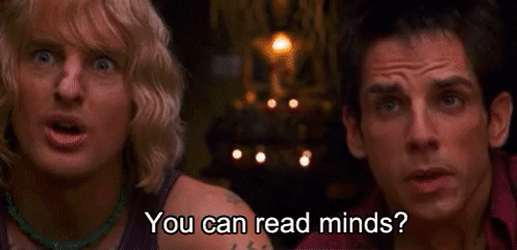Negative Automatic Thoughts III: Mind Reading
The next negative automatic thought (NAT) that arises from not looking at the whole picture is mind reading. For some reason, people believe that they have developed the superpower of reading what other people are thinking, despite most people not even being aware of what they are thinking themselves! Do you think psychologists can read minds? Ask a psychologist and you’ll either get a friendly laugh or a scoff of disgust. What about magicians? Although they might claim to, they depend on cues, illusions and ambigious statements to try and get you to express what is on your mind without saying anything. For example, “I sense you’re thinking of a human, a man”. If the participant’s eyes lights up, they are correct. If they do not, the magician rapidly changes their narration to “no actually, a woman”. The moral of the story: Nobody can read minds.

Let’s take an example of mind reading and how it can manifest. Imagine that your favourite aunt has cooked you a giant dinner but you are on a diet. You assume that your aunt would be insulted if you don’t eat all of it (unhelpful thought pattern of mind reading) so you continue eating despite being full (unhelpful behaviour). Afterwards, you then feel guilty because you failed to stick to your diet. And we do this all of the time. Mind reading strangers judging us for using an exercise machine incorrectly can stop us from going to the gym. Mind reading our loved ones can stop us from confronting a relationship issue. And even mind reading ourselves for thinking that you’ll think you’re stupid for trying something new. It can be really damaging to our mental health.
How to Correct Mind Reading?
Firstly, an action does not always represent a thought. For example, a person staring at your stomach does not mean that they think you are fat. People can be looking at anything and thinking about something completely different. Secondly, you don’t know what someone is thinking unless you ask. People try to defend this thought by telling themselves that they know the person well but that’s irrelevant. If I asked my best friend to tell me what word am I thinking, the odds of them getting it right are still 100,000 to 1, no matter how well they know me (There are 171, 476 words in the dictionary but I won’t claim to know all of them). Finally, be aware of narcissism. When you try to mind read others, you sometimes assume that they are thinking about you. However, people are far more likely to be thinking about something in their own lives rather than you. Therefore, if we stop obsessing over ourselves, we stop personalising the thoughts of others. In summary, it doesn’t matter what their behaviour is showing, it doesn’t matter how well you know someone and it’s more than likely not about you.
“One of the biggest mistakes we make is assuming that other people think the way we think.”
Nelson Mandela
So how do we stop trying to mind read? It’s actually simple enough. We just realise that what someone is thinking cannot be true unless they state it. Behaviour is often an indication but it is not full evidence. If your aunt makes you too much food, just thank her but explain that you are on a diet so won’t eat that much. If you want to go to the gym, ask a friend would they judge you. If you are having an issue in your relationship, ask for your partner’s perspective. And if you want to do something new, try it and see what your thoughts are afterwards. We can spend our days going around in rings and trying to make assumptions but at the end of the day, your prediction of what they are thinking might be true but you won’t know until they say it, so why bother? Building an opinion based on what you think someone is thinking is like trying to build a skyscraper with a foundation of faulty bricks. So in conclusion, stop trying to read other peoples’ minds. Think better. Think smarter. Think healthier.
Yours Sincerely,
The Motus Movement.